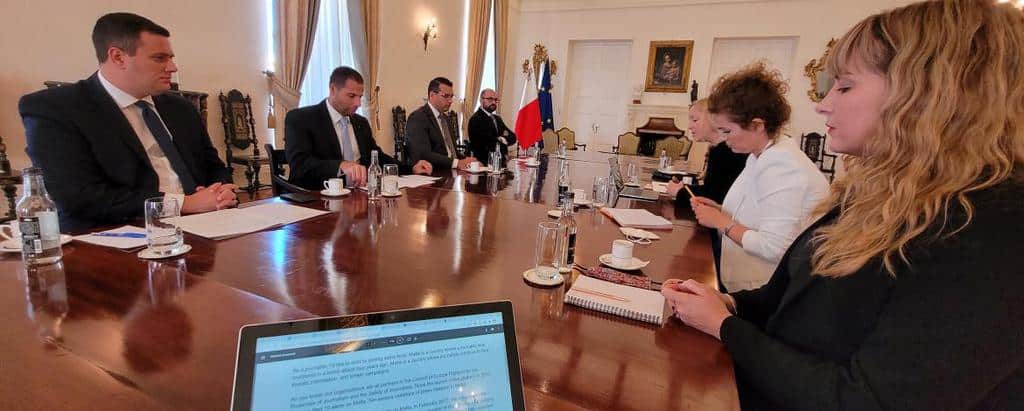
European press freedom NGOs reiterated their offer of technical assistance to the Maltese government and the Commission of Experts appointed by Prime Minister Robert Abela to implement the recommendations of the Daphne Caruana Galizia public inquiry.
In their annual report on their activities to promote press freedom 15 international NGOs that partner with the Council of Europe to promote the protection and safety of journalists, recalled their meeting with Robert Abela last October. “In particular, they sought assurances that the Maltese authorities would refrain from amplifying a policy of media regulation; ensure the passage of comprehensive legislation tackling Strategic Lawsuits against Public Participation (SLAPPs); improve access to information; engage in continuous transparent consultation and dialogue with civil society and journalists’ organisations; and contribute to changing the culture of how journalists are treated in Malta – including ensuring better protections for journalists to be able to do their jobs safely.”
The NGOs also recalled their reservations when news emerged that Robert Abela had set up a Commission of Experts. The “group selected by the Prime Minister would not necessarily meet the high expectations set out by the Public Inquiry,” the NGOs remarked. “The Prime Minister did not publish terms of reference for the selection of candidates, did not openly consult with civil society about the appointment of the Committee of Experts, and did not respond to a letter from civil society seeking clarification. Concerns were also expressed that the government’s proposal to tackle SLAPPs was not in line with international standards and would not adequately eradicate the practice of the abuse of these vexatious lawsuits against Malta’s journalist community.”
On SLAPPs, the NGOs’ report noted that “a former Satabank co-owner failed in his attempt to sue in a Bulgarian court Maltese blogger Manuel Delia for an article published by a Maltese website.”
The press freedom organisation also recalled that last August “spoofing attacks were carried out against the Maltese blogger Manuel Delia, the Maltese NGO Repubblika and the news websites Newsbook, Net News, Lovin Malta, TVM and Strada Rjali.” The NGOs remarked that “Prime Minister Robert Abela eventually condemned the growing disinformation campaign.”
The most significant concern about press freedom in Malta remains impunity. “The Platform partners welcomed the conclusions of the Public Inquiry and the murder of investigative journalist Daphne Caruana Galizia in Malta and hailed the indictment of the alleged mastermind, but these milestones were the result of a painful and painstaking battle and do not guarantee justice.”
Elsewhere in their report the NGOs lamented that “persistent delays and administrative obstacles to the judicial process (in the case of Daphne Caruana Galizia) during more than four years since the journalist’s killing demonstrate fundamental weaknesses in Malta’s commitment to open and equal justice.”
The report is updated with the impact of the Russian invasion of Ukraine which happened at the time of the report’s finalisation. The NGOs speak about the “dramatic consequences on press freedom” of the invasion.
The report was signed by the European and International Federations of Journalists, the Association of European Journalists, Article 19, Reporters Without Borders, the Committee to Protect Journalists, Index on Censorship, the International Press Institute, the International News Safety Institute, the Rory Peck Trust, the European Broadcasting Union, PEN International, the European Centre for Press and Media Freedom, Free Press Unlimited, and the Justice for Journalists Foundation.